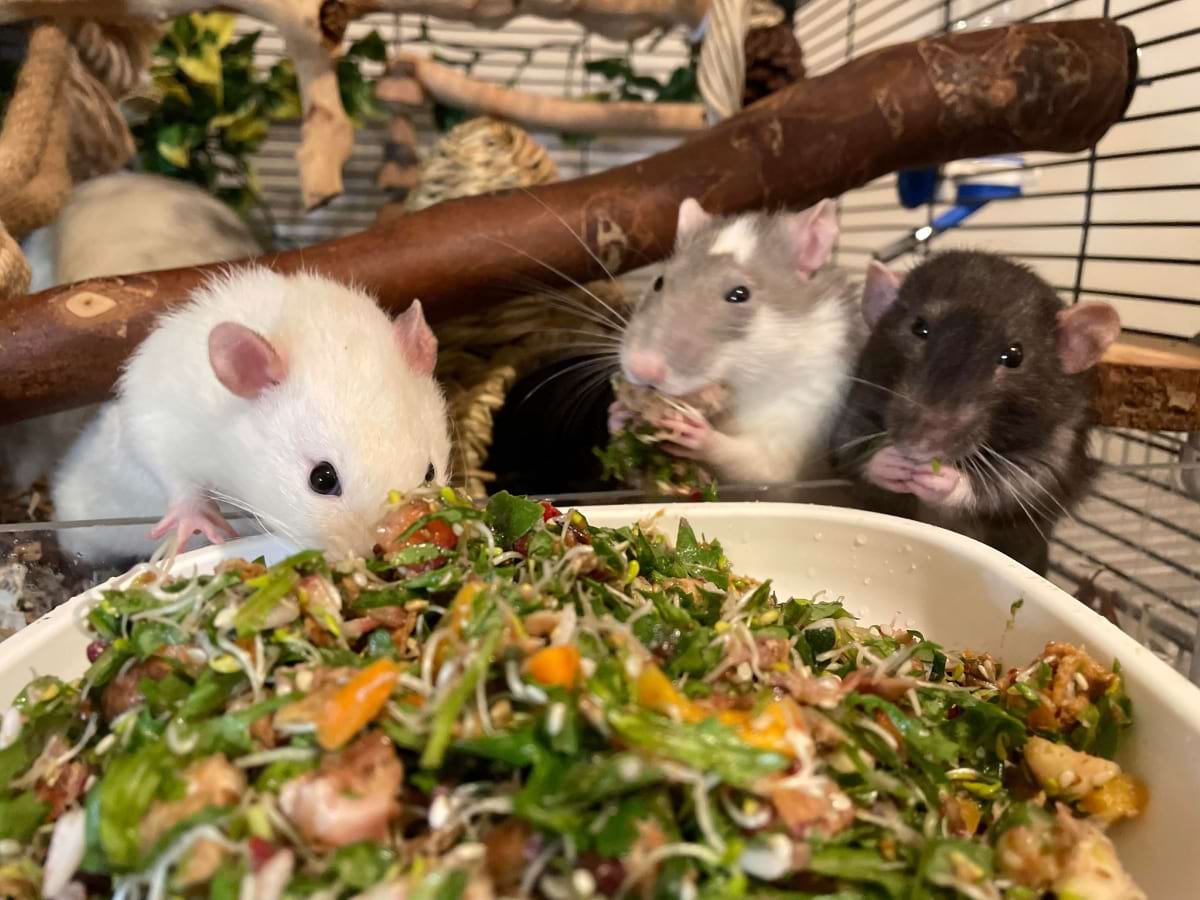quartetoolinda.com – Pet rats are intelligent, social animals that require a balanced and nutritious diet to stay healthy and active. Feeding your pet rats the right types of food ensures their overall well-being and can even extend their lifespan. Understanding their dietary needs and offering a variety of healthy options is key to keeping your furry companions happy. Here’s a complete guide to what to feed your pet rats and how to maintain a proper feeding routine.
1. Basic Nutritional Needs of Rats
Rats are omnivores, just like mice, which means they thrive on a diet that includes a mix of plant-based and animal-based foods. Their diet should consist of:
- Protein: 12-14% protein for adult rats
- Fat: 4-6% fat content
- Fiber: A small amount of fiber to aid digestion
Feeding rats a diet too high in fat or protein can lead to obesity or other health problems, so balancing these macronutrients is important.
2. Commercial Rat Food
The foundation of a pet rat’s diet should be a high-quality, commercially formulated rat pellet or block. These foods are nutritionally balanced and specifically designed for rats. They provide the essential vitamins, minerals, and nutrients that rats need for growth and maintenance.
When choosing commercial rat food, look for brands that list whole grains, soy, or other high-quality ingredients at the top of their ingredient list. Avoid seed mixes as they can encourage selective feeding, where rats pick out their favorite bits and leave behind the healthier parts.
3. Fresh Fruits and Vegetables
In addition to commercial rat food, fresh fruits and vegetables should make up a significant portion of your rat’s diet. Offering a variety of fresh foods ensures they get essential vitamins and minerals. Some excellent options include:
- Fruits: Apples, berries, grapes, melons, and bananas
- Vegetables: Broccoli, spinach, carrots, zucchini, and peas
It’s important to introduce fresh foods gradually to avoid digestive upset. Also, ensure that all produce is thoroughly washed to remove pesticides.
4. Healthy Protein Sources
Rats benefit from occasional servings of protein, especially for growing rats or nursing females. Some safe protein options include:
- Cooked eggs
- Lean chicken or turkey (cooked, unseasoned)
- Tofu
- Small amounts of plain yogurt or cottage cheese
Remember that rats don’t need a large amount of protein in their diet, so these should be given in moderation.
5. Healthy Treats for Rats
Rats love treats, but they should be given sparingly to prevent overfeeding and ensure they stay healthy. Some safe and healthy treats for rats include:
- Whole grains like oats or unsweetened cereal
- Small amounts of unsalted nuts or seeds (e.g., sunflower seeds, almonds)
- Cooked pasta or rice
Treats should only make up about 10% of your rat’s diet to avoid excess calories and ensure they’re getting the nutrition they need from their regular food.
6. Foods to Avoid
While rats can eat a wide variety of foods, there are some that should be avoided due to potential toxicity or negative health effects. Some of these include:
- Citrus fruits (for male rats, as they can increase the risk of kidney damage)
- Raw beans or peanuts
- Green potatoes
- Sugary, salty, or processed human foods
- Chocolate, caffeine, or alcohol
These foods can cause digestive issues, weight gain, or even be toxic to rats.
7. Hydration: Always Provide Fresh Water
Rats need access to fresh, clean water at all times. Use a water bottle designed for small animals to keep the water clean and prevent spills. Check and refill the water daily, and clean the bottle regularly to prevent bacteria buildup.
8. Feeding Guidelines and Tips
- Portion Control: Rats can overeat if given unlimited access to food. It’s best to provide measured portions of their staple food daily, and monitor their weight and activity levels.
- Variety in Diet: While commercial food is essential, offering a variety of fresh fruits, vegetables, and occasional protein treats will keep your rat’s diet balanced and interesting.
- Observe Eating Habits: Keep an eye on how your rats are eating. If they start losing weight, overeating, or displaying unusual behaviors, consult a veterinarian for advice.
9. Final Thoughts
Feeding your pet rats a balanced, nutritious diet is essential for their health and happiness. By combining high-quality commercial food with fresh produce and occasional protein sources, you can ensure they stay healthy and active. Avoid harmful foods and treats in moderation to keep your rats at a healthy weight and prevent digestive issues. Providing the right food, along with plenty of water and attention, will help your pet rats thrive for years to come.
